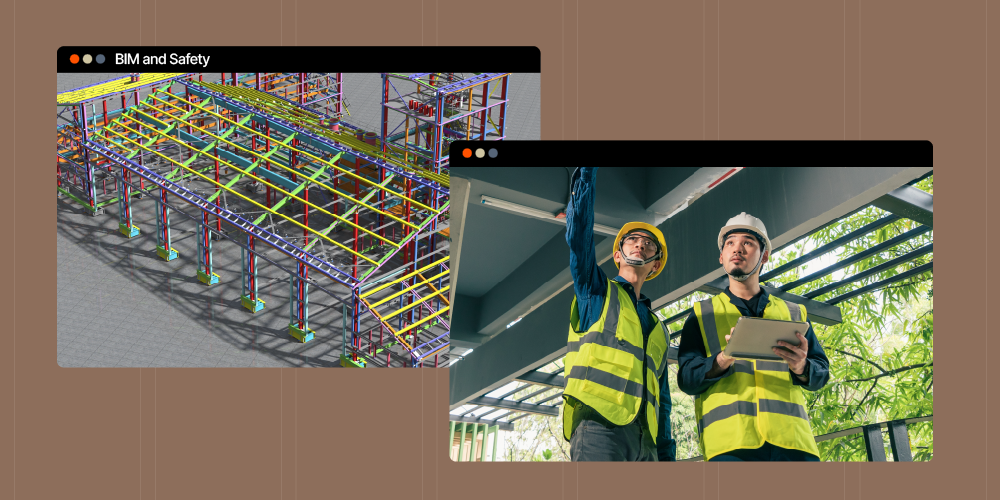— 6 min read
What Does a Construction Safety Manager Do?
Last Updated Sep 1, 2024
Last Updated Sep 1, 2024

Construction sites require strict adherence to safety protocols, as a single mistake can lead to major liability for property damage and potential injury to workers. A designated safety manager helps ensure the safety of all construction workers at a site. Safety managers are responsible for guaranteeing that the onsite personnel are taking proper safety precautions, executing the site's designated safety plans, and regularly performing workplace inspections to make sure that no unsafe conditions arise.
Having experienced personnel present at the jobsite creates an environment where workers can be productive and feel secure in their abilities without risking their personal health or well-being.
Table of contents
What does a construction safety manager do?
Construction safety managers are responsible for ensuring workers on construction projects maintain the highest level of safety. As an integral part of any complex or challenging project, a safety manager works in close collaboration with project owners and contractors to develop safety plans and protocols that foster an open culture of safety.
"I see safety managers yelling and screaming at the workers in front of everybody,” says Joe Alvarez, Regional Safety Manager at Tri-City Electrical Contractors. “By doing that, people don't respect you."
Safety managers may need specific certifications to qualify for a particular construction project. These can include Hazardous Material Management (HAZWOPER), Construction Health & Safety Technician (CHST) CSCS or CCDS cards, 10-Hour or 30-Hour OSHA Construction Outreach Training Program (COTP), and FIRST AID/CPR certification. Training programs also come under the jurisdiction of the Safety Manager, along with conducting inspections regularly at job sites to check on all policies and procedures.
It's the job of a safety manager to ensure that everyone involved in any given project complies with company standards as well as local and state laws governing buildings, such as health codes, building codes, plumbing codes, or electrical codes. They also need to stay up-to-date with relevant industry regulations, such as drafting emergency exit plans or targeted instruction for personnel operating machinery onsite. Ultimately, it's the responsibility of a safety manager to ensure employee well-being and productivity, which is why their role should not be understated in any way regarding any type of construction project, from small-scale interior design work to large-scale structural development.
Read More: Top Habits of Successful Safety Managers
Safety manager job description
Construction safety manager responsibilities
A safety manager bears a lot of responsibility in the project life cycle. Initially, construction safety managers must actively assess the environmental and structural hazards that need consideration. Different parts of a project can have different standards set by OSHA legally required for workers' safety, as well as any additional standards or guidelines imposed by hiring companies. After assessing needs and standards, a safety manager creates detailed plans for protecting against potential hazards as well as how best to react to accidents, incidents, or emergencies that can arise.
In addition to planning safety measures, a safety manager is also responsible for recruiting and training workers on how to work safely with the personal protective equipment (PPE) and other equipment provided, as well as how to identify potential hazards. Construction safety managers regularly conduct toolbox talks to review the projects' objectives, evaluate the protection measures in place, and identify the resources needed to complete each task safely. Communicating basic dos and don'ts at frequent intervals is essential in any environment-friendly project.
A safety manager's core duties also include site inspections. This process involves walking the job site as often as possible to assess safety hazards, comply with regulations, enforce procedures, and promote safety awareness. Every inspection entails a thorough documentation process of tracking relevant information, such as construction progress. On top of this, safety managers are in continuous communication with management to discuss related issues and report findings.
Learn more: How to Write a Construction Safety Report
During inspections and regular check-ins, they identify which job site activities require the use of JSA/JHAs, which restrict high-risk tasks, provide clear instructions on how to safely complete them, and monitor employee safety behavior regularly. Further responsibilities involve claims management, where all injuries are reported through insurance carriers for validations and proper filing to avoid any unexpected costs due to potential lawsuits.
Courses about construction.
For construction.
Unlock your career potential with our free educational courses on Health & Safety, Data in Construction, and more.
Construction safety manager skills and experience
A successful construction safety manager must possess various skills and experiences to succeed. Most job openings call for individuals with 5–10 years of safety experience, as well as excellent communication skills and the ability to think critically and solve problems when unforeseen circumstances arise.
It is also important for a construction manager to have an understanding of regulations and standards, the ability to recognize hazards, injury management knowledge, and organizational skills such as time management and task prioritization. Depending on the project scope and timeline, some travel may also be required. Construction safety managers should also keep in mind that depending on the site conditions it may also be necessary for them to stand, sit, walk, or climb stairs or ladders during their daily activities.
Construction safety manager education and training
Safety construction management plays an essential role in the modern construction industry. A bachelor's degree is usually required to become a safety manager, though additional certifications are also strongly recommended. These certifications depend heavily on the size and scope of the project and can include OSHA 30, OSHA 50, OSHA 500, and more. Furthermore, certifications from recognized safety organizations — such as the National Safety Council (NSC), American Society of Safety Professionals (ASSP), and American Conference of Governmental Industrial Hygienists (ACGIH) — may be very desirable in order to stand out in a competitive job market.
"Training in the field is important, schooling is important, I take every course that I can in safety, which is good because I pass all that knowledge and information to everybody in this building," says Alvarez.
It's important to be aware that not all safety requirements are universal — different jurisdictions may have their own laws regarding safety training requirements. For instance, New York City has specific security training for a safety manager to operate properly by state law.
Construction safety managers should note that these requirements can vary significantly from one location to the next, so any aspiring or current safety construction managers stay well informed about the rules of their particular jurisdiction. With high-level education, professional certifications, and expertise in local regulations related to safety management, builders can quickly establish themselves as experts in their field, able to meet the challenging conditions of modern construction safety regulations.
Salary: How much do construction safety managers make?
The salary level of construction safety managers depends largely on their geographical location. According to Glassdoor, the national average for this role stands at around $78,000; however, this can vary considerably.
For instance, if one were to work as a construction safety manager in New York, Salary.com estimates that the average salary would be closer to $133,000. The high-paying coastal cities offer higher wages than other parts of the country, potentially due to high levels of competition and employment needs in those industries.
Knowing these figures is a great way for those already working in or aspiring towards the construction safety management field to plan their budget and develop a reliable career strategy.
Construction safety managers are vital to the construction industry, as they help maintain a safe working environment, reduce liability, and ensure compliance with local and state regulations. By investing in their education, training, and professional development, safety managers can contribute to the successful completion of construction projects while safeguarding the health and well-being of workers.
Was this article helpful?
Thank you for your submission.
100%
0%
You voted that this article was . Was this a mistake? If so, change your vote here.
Scroll less, learn more about construction.
Subscribe to The Blueprint, Procore’s construction newsletter, to get content from industry experts delivered straight to your inbox.
By clicking this button, you agree to our Privacy Notice and Terms of Service.
Categories:
Tags:
Written by
Clark Jensen
10 articles
Clark Jensen joined Procore as a Senior Strategic Product Consultant, Quality & Safety where he spearheads product knowledge education and executes product demonstrations. He brings several years of experience in roles both on and offsite as a former senior project safety manager for a general contractor in Salt Lake City, and a senior risk control consultant for a large U.S.-based insurance firm.
View profileBob Hanes
14 articles
Bob Hanes is a professional writer and entrepreneur. He previously worked as a military sales and applications engineer for an aerospace firm, and cofounded a biotech company that creates drug screening solutions for the pharmaceutical industry. Bob has an MBA from the University of Buffalo in Logistics, Materials, and Supply Chain Management, and a BE in Mechanical Engineering. He is an avid Buffalo Bills fan.
View profileExplore more helpful resources

The Strategic Partnership Between Construction Safety and HR
A construction safety manager’s role is significant: It entails broad oversight over the construction workplace to prevent incidents that could cause worker injury or property damage. In addition to this...

Enhancing Construction Safety with BIM Technologies
The construction industry is no stranger to tools: Even ancient civilizations developed mallets and axes to make their work easier. Today’s latest tools look different, but they can be as instrumental...

Construction Safety Training – Goals, Benefits & Emerging Trends
Construction safety training (CST) educates workers about the risks they face on construction sites and teaches them how to prevent accidents, injuries and fatalities. The construction industry has the highest...

Technology for Construction Safety: Strategies to Supercharge and Scale Safety Practices
The construction industry is no stranger to the arrival of new technology, and builders are realizing its many benefits. Modernization across the industry is helping contractors streamline operations, enhance efficiency,...